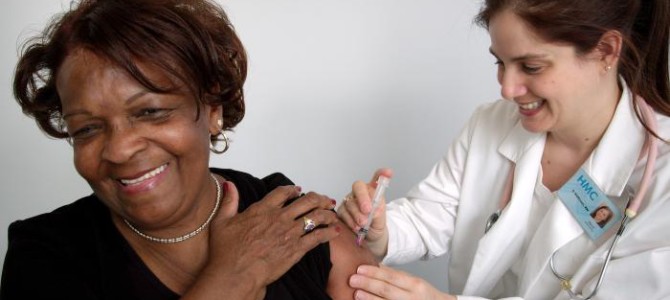November is National Diabetes Month in the United States, and November 14 is World Diabetes Day. These occasions shine a spotlight on a serious disease that can lead to potentially life-threatening complications such as heart disease, stroke, kidney disease, blindness, and amputation. November also offers people with diabetes an important opportunity to protect themselves against influenza — a respiratory illness commonly known as “the flu” — by getting a flu shot.
While CDC recommends that everyone 6 months and older get vaccinated against the flu, it’s particularly important that people with diabetes, and certain other medical conditions, protect themselves from the flu with a flu shot, even if their diabetes is well controlled. If you have diabetes, you should not get the nasal-spray flu vaccine. People with either type 1 or type 2 diabetes are at increased risk of developing serious flu-related complications. When a person with diabetes gets sick with the flu, it may be difficult to maintain their regular diet or medication regimen, which can both lead to changes in blood glucose levels. People with diabetes may have a harder time-fighting infections like the flu. Studies have shown that the flu can lead to secondary infections like pneumococcal pneumonia (people with diabetes should also get the pneumococcal polysaccharide vaccine [PPSV]) or other medical complications such as ketoacidosis. Flu-related complications like these can result in hospitalization and, in extreme cases, even death.
The burden of flu on people with diabetes was demonstrated last season, when people with metabolic disorders (of which diabetes was the most common) accounted for 36 percent of reported flu-related hospitalizations in the United States according to CDC. “This is striking considering that people with diabetes make up only about 8 percent of the U.S. population,” says Dr. Pamela Allweiss of the CDC Division of Diabetes Translation. “Although worrisome, these statistics should, hopefully, motivate people with diabetes to protect themselves against the flu,” says Dr. Anne Schuchat, Director of the National Center for Immunization and Respiratory Diseases. There has been little flu activity in the United States so far this season, but this is not unusual. Most flu seasons don’t peak until February. Dr. Schuchat urges people not to be complacent. “While the exact timing of flu outbreaks and their severity are unpredictable, we do know that they will occur. The best time to get vaccinated is before people around you are becoming ill.”
For more than 50 years, hundreds of millions of people have safely received flu vaccines in the United States. The vaccine cannot give you the flu, and it has been shown to decrease the number of flu-related hospitalizations and deaths in people with diabetes. The most common side effects from flu shots are soreness and redness where the shot is given and, occasionally, body aches or low-grade fever. The risk of severe side effects is very rare. Nearly 26 million Americans are living with diabetes and more than one-quarter of them do not know it. If you or one of your loved ones has diabetes, National Diabetes Month is a great time to protect yourself against the flu by getting a flu shot. For more information, visit Flu and People with Diabetes, Diabetes & Flu: What You Need to Know and Do, CDC’s Diabetes Public Health Resource, or call 1-800-CDC-INFO (800-232-4636).
Information provided by the CDC. To view this article: http://www.cdc.gov/media/matte/2011/11_diabetes_fluvaccine.pdf


